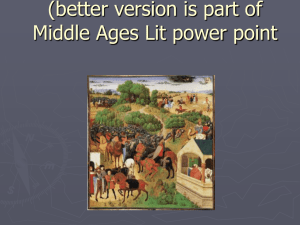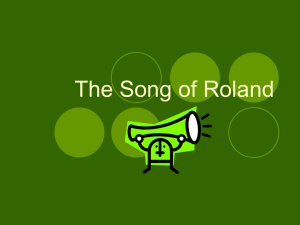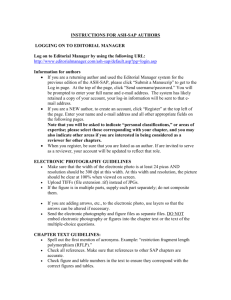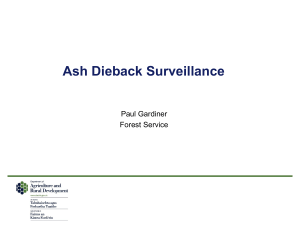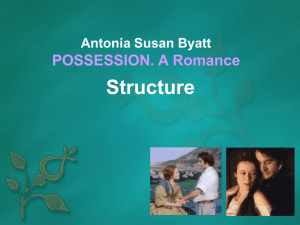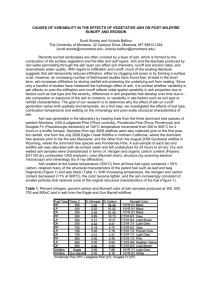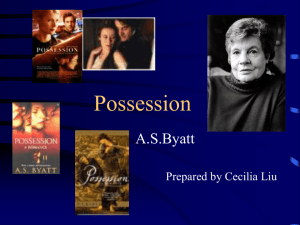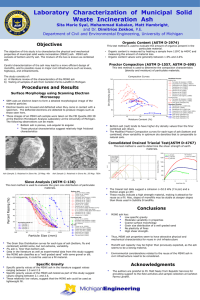Possession: Chapter 1 Themes & Plot Analysis
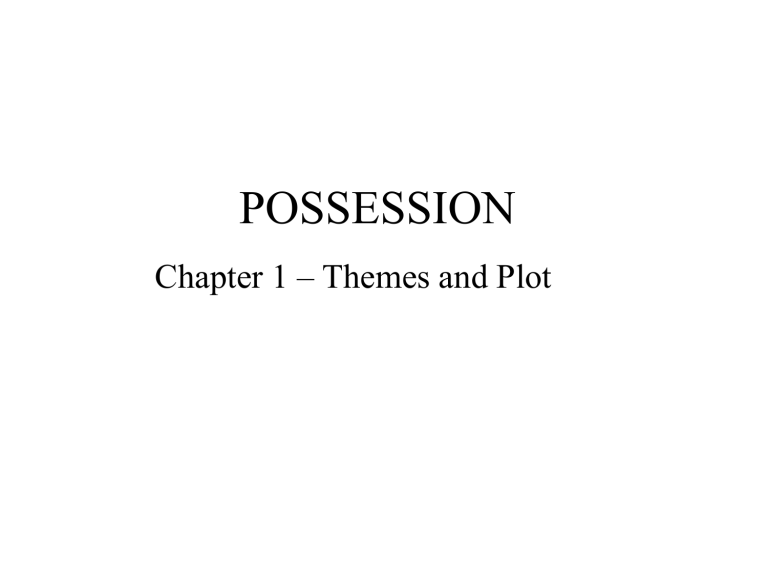
POSSESSION
Chapter 1 – Themes and Plot
The Garden of Proserpina
• Excerpt from poem by Randolph Henry Ash, the
Victorian writer researched by Roland
• Contains seminal elements of book
– The serpent (Melusina) and other symbols
– The connection between myth, legend, history and
“truth”
(They are and were there – At the old world’s rim – dozed and waited through eternity)
– A vision of an “earthly Paradise” like the one the two
Victorian lovers (and their 20th century researchers) will eventually visit in Yorkshire
Chapter One Plot
• September 1986.
• Roland Michell, part-time research assistant to Prof.
Blackadder, is in the Reading Room of the London Library.
He loves this place because it is full of history and literature and because R.H. Ash himself came here to read.
• He’s got R. H. Ash’s personal copy of Vico’s
Principj di
Scienza Nuova, which he is examining in the hope of finding marginalia showing that this work was one of the sources of
Ash’s poem. He is excited at holding the book in his hands.
• The book is very old and dusty; it is clear that nobody has touched it for a very long time, perhaps since it came to the library.
Plot - 2
• As Roland opens the book, several pieces of paper fall out, covered in Ash’s handwriting.
• Roland requests and obtains permission to study them by presenting his credentials (Blackadder has been editing
Ash’s
Complete Works since 1951), on condition that he does not disturb their chronology and reports back on anything interesting.
• After a few hours, he finds what he thinks is “the relevant passage” in Vico, who had looked for historical fact in the poetic metaphors of myth and legend (putting them together was his “new science”).
• Roland compares Ash’s test with the translation and makes notes on an index card.
Roland’s notes on Vico
• Ears of corn were called apples of gold (when metallic gold was still unknown)
• The apples brought back from Hesperia by
Hercules must have been grain
• The Gallic Hercules chains men by the ears with links of this gold (a myth concerning the fields)
• Hercules was consequently the Deity to propitiate in order to find treasures
• Proserpine (or Ceres) was carried off to the underworld
• In Virgil’s poem, the golden bough that Aeneas carries into the Inferno or Underworld was made of this golden apple
Different interpretations of the figure of
Proserpine
• Corn, the origin of commerce and community (Vico)
• Victorian reflection of religious doubt and meditation on the myths of Resurrection (Ash, according to some)
• The personification of History itself in its early mythical days (Blackadder’s idea of Ash’s vision)
• Ash describes her as gold-skinned in the gloom, also grain-golden and bound with golden links
• Roland wonders if she could represent the ephemeral individual or the Species, that dies not
Discovery of the Letters
• Roland is already reluctant to share this new treasure with Blackadder when he discovers two folded sheets of writing paper
• They contain two versions of the same letter, both incomplete, written in Ash’s hand and addressed to a
Dear Madam who goes out in company very little
• The letters speak of a conversation between the two that the poet enjoyed very much and is eager to renew
• The conversation took place during a breakfast offered to a group of people by Crabb Robinson
Difference between the Letters
• The 1st letter is shorter and Ash is more emotional and direct, but is in any case careful not to show that he presumes the woman shares his same urgency
• In the 2nd letter, Ash is more controlled and tones down his enthusiasm:
– our extraordinary conversation becomes pleasant and unexpected ;
I have thought of nothing else becomes little else;
– He does not speak of the rarity of finding such ready sympathy, such wit and judgment together, but talks at length about Crabb and the poets and undergraduates and mathematical professors and political thinkers at his table, a more neutral subject
– He changes I feel, I know with a certainty that cannot be the result of folly or misapprehension, that you and I must speak again to Is there any way in which it can be resumed, more privately and at more leisure?
Difference between the letters/2
• In the 2nd letter, he asks questions involving her or both of them
(Is there any way…? Did you not find it as strange as I did…? We did understand each other uncommonly well, did we not? Or is this perhaps a product of the over-excited brain…?) instead of making emphatic personal statements of his own (It has not often been given to me as a poet… I write with a strong sense of necessity…I feel, I know…)
• He eliminates must and uses can
Difference between the letters/3
• In version 2, he balances his egoistical mutter – his excitement at her sensitive understanding of his works - by showing an interest in her works:
– He compliments her on the superiority of her fine ear and finer taste and adds that she is wise and learned
– He encourages her to begin her grand Fairy Topic
– He suggests she consider Vico’s idea that the ancient gods and later heroes are personifications of the fates and aspirations of the people rising in figures from the common mind
• He tries to persuade her to come out to meet him.
Roland Takes Possession
• Roland is profoundly shocked but also thrilled
• He immediately contextualises the period (after 1856) and decides to reconstruct the breakfast party organised by the
London University professor
• He knows that Robinson’s papers, including his diary, are kept in Dr. Williams’s Library in Gordon Square
• He has no idea who the mysterious woman and her Fairy
Topic were
• He is eager to discover if the correspondence continued or not and wonders what jewels of information it might contain about a man who lived a quiet and exemplary married life for forty years
• Roland does something completely uncharacteristic: he slips the letters into his own book, finishes his work and leaves the library with the letters in his possession.
